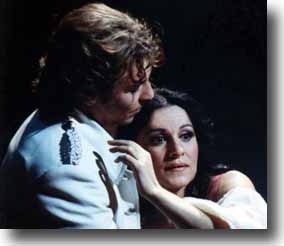This page was last updated on: October 26, 2008
REVIEW
Faust, Vienna Staatsoper, October 2008

Roberto Alagna and Angela Gheorghiu in Faust, October 2008
Photo by Axel Zeininger, Vienna Staatsoper
Vienna director sick, but good music saves opera
George Jahn, Associated Press, 11 October 2008
Damnation was the dominant theme Saturday in a new Vienna State Opera production of Charles Gounod's Faust. But redemption triumphed in the form of wonderful singing and a powerful orchestral performance.
On stage of course was Mephistopheles, Satan in human form, who offers Dr. Faust his youth in exchange for his soul, setting off the series of events that leads to tragedy for him and Marguerite, the innocent object of his desire.
The performance had to cope without two key production figures and the results were predictable. Minimalistic scenery and stage direction left the production barely distinguishable from a concert performance of the opera.
What there was to see was unimaginative the stage was dominated by a boring backdrop of movable metal frame rectangles. Instead of setting off erotic sparks, the Witches Sabbath scene fizzled, despite its tableau of skimpily clad figures. And the lighting was basic devilish red for Mephistopheles and virgin white for the pure Marguerite.
Those missing were director Nicholas Joel who suffered from an unspecified illness that lasted into Saturday's premiere, and scenographer Andreas Reinhardt who died during rehearsals.
The audience was required to concentrate on the music and hope for the best. And here, good triumphed.
Angela Gheorghiu's Marguerite suffered perhaps for the lack of stage direction, with dramatic moments that she was unable to fully exploit, although her brief mad scene at the end of Act 4 was chilling.
But her voice made up for it. Although naturally small, its pureness and versatility fit the role of the virginal God-fearing heroine first seduced by Faust and then pregnant hung up and left out to dry by the devil driven hero-villain.
With singing at turns fervent, intense or urgent, Gheorghiu easily brought the required lyricism to Marguerite's signature "Jewel Song" in an effortless rendition that reached all the high notes without stretching.
Perhaps the fact that Gheorghiu's lover in Saturday's production is her real-life partner helped.
As Faust, Roberto Alagna was initially choked and he seemed to be pushing for that high C in the Act II garden scene where he rhapsodizes about Marguerite's purity. But his voice soon loosened up to full and lovely lyric tenor dimensions.
And his acting was among the best of all the main characters important in a role spanning the full range from crotchety old scientist to pleasure-seeking young hedonist and finally to rueful sinner who recognizes too late the error of his ways.
Of course he could always claim the devil made him do it. And who could have resisted Kwangchul Youn?
Mephistopheles' Act II homage to the Golden Calf seemed made for his rich dramatic bass. And while his getup was uninspiring top hat and tails in the first acts, bare-chest and black leather later he owned the role, exploiting its comic aspects while playing up the sinister sides.
You could almost smell the sulphur.
Kudos as well to Adrian Eroed as Valentin, Marguerite's brother; Michaela Selinger as Siebel, the heroine's shy admirer, and Janina Baechle as Marthe, the love-struck domestic misdirecting her affections at Mephistopheles.
Holding it all together musically, conductor and Bertrand de Billy coaxed a strong performance from Vienna State Opera orchestra from the first notes of the overture with its somber themes of sin and redemption to the near final crashing chords heralding Marguerite's salvation. And the State Opera choir was admirable in a work that relies heavily on ensemble singing.
Goethe, the great German poet whose Faust is among the major literary works of the Western world, once said he believed that only Mozart was enough of a musical genius to write an opera based on the theme.
But on Saturday, he would have been pleased with Gounod.